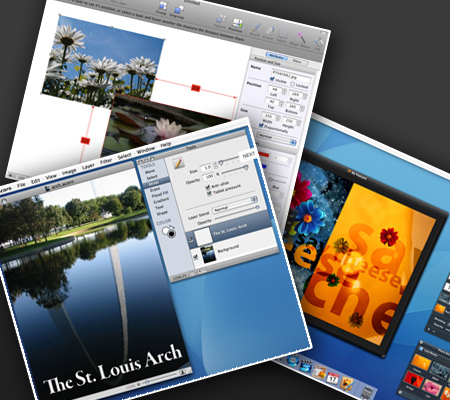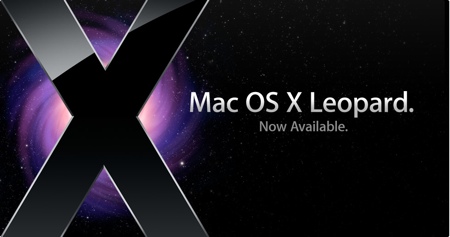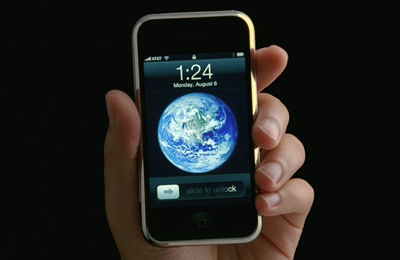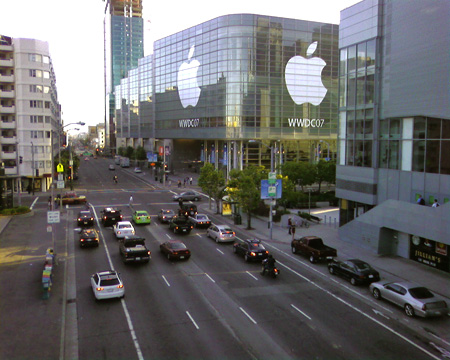The Year in Mac Development 2007
I don't think anyone could have scripted this year. It was more like tumbling along in a hurricane than walking a slow and steady path. There were two big — really big — landmarks for Mac developers this year, so it's hard to pin one as the definitive event.Leopard
The two big events are, of course, the release of Leopard and the iPhone. For Mac developers specifically, I think we'd have to declare this the year of Leopard. It's such a radical step forward for the entire platform, that it eclipses even the introduction of a new piece of hardware in a new form factor.
Leopard — which has been talked about at length here already — is a complete revamp of Mac APIs. Core Animation shifts our entire perspective on graphics programming, Objective-C 2.0 brought garbage collection and properties, true 64-bit framework support has finally reached these shores, Xcode 3 and Interface Builder 3 arrived, and a mountain of other improvements. All of this will likely filter its way into iPhone, as well.
There's so much new that we saw one app after another jump to Leopard-specific development at the exclusion of previous versions of Mac OS X, and I think that's only going to accelerate.
iPhone
The iPhone was big news too. And that's putting it lightly. It felt like the country absolutely came to a standstill in late June as everyone in creation lined up to make sure they got a phone. There's no question the technology industry woke up to a different world on June 30.
Amazingly, the first round of TV ads featured just the iPhone user interface. That's it. The contrast between this an any other mobile phone ad is jarring. Practically every other manufacturer advertises their phone by spinning them around the screen. The iPhone ads just show the actual phone. The experience of a phone doing calls, voicemail, maps, internet and email — all packaged into a touch-based interface which is a joy to use — is so groundbreaking that it stands on its own.
Although some people have figured out how to write apps without any documentation, the real ride will likely start early this year, when an actual SDK is scheduled to arrive. I'm interested to see how many Mac developers will be born from writing iPhone apps.
Amazingly, the Macworld keynote for 2007 sparked the notion that Apple wasn't going to focus on computers anymore and was just making phones and music devices. The proof? No Mac announcements, no iLife, and dropping "Computer" from the company name. I think that reaction seems positively insane now.
There will probably be a day in the future where there is no line between a phone and a computer, but I don't think any of us know when that will be. For now, nobody wants to edit video on a phone.
WWDC
WWDC was one of the biggest shocks of the year for me. The changes in the platform didn't really sink in until I saw a sea of people in Buena Vista Gardens. This was the first year I remember walking around and going several hours without seeing someone I recognize.
Even more interesting was the attendance level of the "Mac OS X Immersion" sessions, which are aimed at developers coming to the platform for the first time. Our little group has grown up.
I had a blast at the "Going Indie" event at the Apple Store during WWDC week, too. We had Wil Shipley, Gus Mueller, Daniel Jalkut, and Brent Simmons show up to take part, and we absolutely packed the place. People came up to me for days after (and presumably to the other guys as well) just to say how much they enjoyed it. Absolutely one of the highlights of the week for me.
Trends
Mac-specific graphics apps hit in a big way in 2007. For the first time in history, image editing tools written by independent developers have become a legitimate alternative to higher-end tools such Photoshop, which has at least dozens of developers. Maybe hundreds.

Pixelmator stands out as an app that is actively going after this market, whereas Acorn (previously mentioned here), I think, has set out to be a different kind of graphics tool. Neither are enough to be felt by Adobe yet, but the ice has started to melt and the progress is relentless. Both make a strong showing even at 1.0.x with fraction of the engineering staff.
Interestingly, neither of these apps even rely on Leopard API. So contemplate what happens when they can do so.
These are not the only two options by a long shot. DrawIt has been around for a while, Naked Light takes different approach, and Iris lurks in the shadows.
Taking a step back, this was probably the first year that being an independent Mac developer didn't seem weird anymore. The idea that "you can't make money writing Mac software because 'everyone' uses Windows" just doesn't pass the truth test. Wil Shipley first shed light on this way back in 2005 at his student talk, challenging all of those beliefs we assumed to be true.
It turns out that unless you're writing enterprise software, it may actually be more fiscally practical to write Mac software because you have great tools and an audience with a voracious appetite for well-designed software. And they will pay you for it. Happily.
This was also the first year in the modern era that it was no longer unusual to own a Mac. And strangely, there was no one event that triggered it. It just suddenly became so.
There's an entire "generation" of computer users now that weren't around for the platform wars of the early nineties or simply didn't care because it wasn't a mainstream issue. For this generation, there's no perceived stigma for the Mac to overcome. The Mac is a computer made by the people who made the iPod, iTunes, and the iPhone. It's not Apple Computer, it's Apple. The struggle is over, and we're on to something new.
Personally
Finally, this was an amazing year for me personally. There are so many things I'm thankful for and so many unexpected surprises. I'm incredibly thankful for everyone who hangs out here and shares their thoughts. It makes the whole thing more interesting. I also feel very honored and humbled for being voted into the MacTech 25.

The Year in Mac Development 2007
Posted Jan 1, 2008 — 10 comments below
Posted Jan 1, 2008 — 10 comments below














Warren Marshall — Jan 01, 08 5303
And Spaces and Time Machine and ... Apple rules!
Moitah — Jan 01, 08 5304
Have a great year 2008 to !
And thanks for the little review of 2007 from your point of view... I don't have the courage to write one myself...
nevyn — Jan 01, 08 5305
And maybe get one of my many dozen Mac projects ready for release and get something modern out the door :P And make SoundApp usable. And and... 2007 was fun, but I bet 2008 will be awesome :)
Andy Lee — Jan 01, 08 5306
"This year, I MUST attend WWDC. It's been a dream for so long, but I've never been able to afford it."
That was exactly my thought in 2007. I am so glad I finally made it -- WWDC was the highlight of my year.
Happy New Year, everybody!
Paul Robinson — Jan 01, 08 5307
Looking forward to reading more great articles this year!
Daniel Price — Jan 02, 08 5310
While Apple has made huge in-roads into the home market, it's made little impact elsewhere. I'm a developer and would love to be employed to develop Cocoa apps that I care about. The technologies are there to make amazing apps for OSX, but it's ignored by everyone other than 'indie' developers and hobbyists and the job market reflects that.
Scott Stevenson — Jan 02, 08 5311
In theory, I agree that selling more Macs is good, but I'm not sure the folks that are looking for cheap, low-end commodity hardware are really potential Apple customers. There's a big difference between hardware that offers good value (which I think iMac/iBook do), and cheap hardware. No-name brands will always win on the second count.
In terms of Apple targetting the enterprise market, what do you think they should do? It seems not everyone agrees on what it should be. I can completely understand the end result (writing enterprise apps in Cocoa), but I'm not fully convinced this is a good business for Apple to be in. User experience doesn't seem to matter as much to committees as it does to individuals.
If anything, education has been Apple's enterprise, maybe because people are more sensitive to ease-of-use with children than adults.
While Apple has made huge in-roads into the home market, it's made little impact elsewhere.
I'm not sure that's true. Most of the impact has been in the home, but Final Cut Pro has (as far as I can tell) permanently changed digital media production. I think small businesses have started to catch on, too. It's fair to say that there hasn't been a lot of impact in enterprise, though.
The technologies are there to make amazing apps for OSX
I'm not sure really big business care about the "amazing" factor. The mindset seems to be if it stores the data and retrieves it, that's enough for most cases. That basically just leaves price as a factor.
Blain — Jan 03, 08 5312
Those folks won't buy Macs, because they're looking for the Intel Inside stickers. Yes, I'm joking, but admit it: it's true. There will always be those that see computers as disposable objects. And I'm willing to bet that a sizable majority of the low-end PC sales are because the buyers' old systems became so bogged down with malware that it's a failure of the CPU or hard drive, even when the hardware's fine.
From an investment standpoint, almost nothing loses value year over year as fast as a computer. And as for price matching, I have only one word for you: Performa.
I'm not sure really big business care about the "amazing" factor.
With enterprise, the ones buying are not the ones using. That's such a huge hurtle that you really have to be careful what you wish for. Suppose you wake up tomorrow, and all the businesses have switched over to Macs and Cocoa.
But business models won't change, and neither will specs by committee, nor backwards third-party API designs or oceans of third-rate programmers that don't "Get it". Imagine this, but with aqua buttons. Core animation can only do so much!
I have to agree with the frustration of how the CocoaDev job board is empty. But it's part of the tongue-in-cheek nature of the "Indie dev" name. You want to make apps you care about. But I'm willing to wager that it's not enterprise-level apps, regardless of the API. Even with NSObjects, do you really care about merging synergies with B2B CRM that will maximize ROI on your BBQ?
Wanting to be a small fish in a small pond is counterintuitive. I'm still trying to learn that, too. Wil Shipley's talk makes a lot of points, and it's worth a re-listening.
Scott Stevenson — Jan 03, 08 5313
I think tomorrow will be a very good day.
britt — Jan 06, 08 5318
YES!!! Especially when it involves teriyaki sauce!!! Mmmm.... teriyaki burgers....
Ya' know, a lot depends on what you mean by "enterprise"... is it just office? Or SAP clients? Or servers? Or custom apps? How about mainframe stuff? Or... ???
Different areas require different approaches; one wouldn't buy the cheapest thing around to use in a highly critical server or mainframe application; but a cheap 17" thin-client-esq machine would work just fine for a secretary (or customer service rep, or... well, you get the idea).